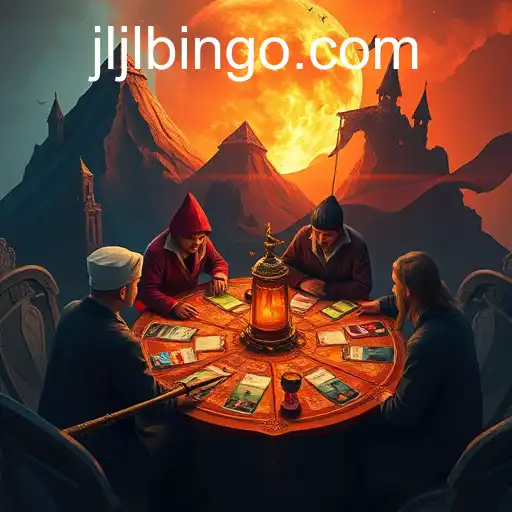Exploring the World of Tabletop Games
Tabletop games have long been a source of entertainment, creativity, and community for people around the world. From the earliest forms of dice games in ancient times to the complex, strategy-laden board games of today, they offer a unique form of interaction and challenge that digital games often strive to replicate. In this exploration of tabletop games, we unravel the various elements that make them so appealing and enduring in modern culture.
The History of Tabletop Games
The history of tabletop games is as diverse and intricate as the games themselves. Originating from ancient civilizations like Egypt and Mesopotamia, games such as Senet and the Royal Game of Ur laid the groundwork for future developments. These early forms of entertainment were not merely pastimes; they were deeply entwined with culture and often had religious or strategic significance.jljl ph
As time progressed, different cultures around the world developed their unique tabletop games. In China, the game of Go emerged around 2300 BC, becoming one of the four essential arts of a cultured gentleman in ancient Chinese society. Similarly, chess, which evolved from Chaturanga in India, became a significant strategic game in Europe during the medieval period, influencing military tactics and strategy.
The Renaissance and Beyond
jljl phThe Renaissance period saw the emergence of card games such as Tarot and the modern deck of playing cards. This era brought about a new wave of creativity and invention in the realm of tabletop play. With the advent of the printing press and mass-produced materials, games became more accessible, leading to an explosion in their popularity.
The 20th century saw the birth of modern classics such as Monopoly and Scrabble. This period was a turning point where games became household staples, enjoyed across generations. The proliferation of genres, including word games, family games, and strategy games, provided something for everyone, laying the groundwork for the tabletop game market we see today.
phhalikThe Variety and Complexity of Tabletop Games
Today, tabletop games encompass a vast array of types and categories. From light-hearted party games to intense, multi-hour strategy games, the options are endless. This diversity is part of what makes tabletop games so appealing and able to cater to a broad audience.
Strategy Games
Strategy games like Catan and Ticket to Ride require players to think critically, plan ahead, and often negotiate with others. These games often involve resource management, territory control, or economic manipulation, challenging players to outthink their opponents.CC6 vip
Role-Playing Games (RPGs)
Role-playing games, such as Dungeons & Dragons, have seen a massive resurgence in recent years. These games allow players to craft their adventures and narratives, working collaboratively in a fantasy setting to achieve their objectives. RPGs are celebrated for their ability to foster creativity and cooperation, making them a favorite among those who enjoy immersive storytelling.
Cooperative Games
Games like Pandemic and Betrayal at House on the Hill focus on teamwork, where players must work together to achieve a common goal. This genre promotes camaraderie and problem-solving, presenting unique challenges compared to competitive games where players are pitted against one another.
Customizable Card Games
The rise of customizable card games such as Magic: The Gathering has created a subculture within tabletop gaming, where players build unique decks for combat. These games combine strategic depth with a constantly evolving meta, keeping the experience fresh and engaging for players.
The Community and Culture of Tabletop Games
Tabletop games are more than just a pastime; they represent a vibrant community and culture that spans the globe. Events such as Gen Con and Essen Spiel attract thousands of enthusiasts who gather to test new games, meet like-minded individuals, and celebrate their shared passion.
The social aspect of tabletop gaming is further highlighted through local game stores and clubs, where players of all ages and backgrounds come together. These spaces provide an environment for learning, socialization, and building connections that often transcend the game itself.
The Impact of Technology
While tabletop games are cherished for their tactile and interactive nature, the digital age has also enhanced the way we play. Apps and online platforms allow for remote play, connecting friends and gamers from distant places. This integration of technology has expanded the accessibility and reach of tabletop games, introducing new players to the hobby who may not have discovered it otherwise.
The Future of Tabletop Games
The future of tabletop games is bright, with designers continuously pushing the boundaries of creativity and innovation. The industry is thriving, with Kickstarter campaigns and independent publishers bringing fresh ideas to the table.
More than just expanding in scope and scale, tabletop games are also evolving in inclusivity and diversity. Designers are increasingly mindful of representing different cultures, genders, and experiences, making the world of tabletop gaming a more welcoming environment for all.
phhalikThe magic of tabletop games lies in their ability to bring people together, forge new friendships, and spark imagination. Whether you're a seasoned player or a curious newcomer, the world of tabletop games offers endless adventures and stories waiting to unfold.










 Join now
Join now